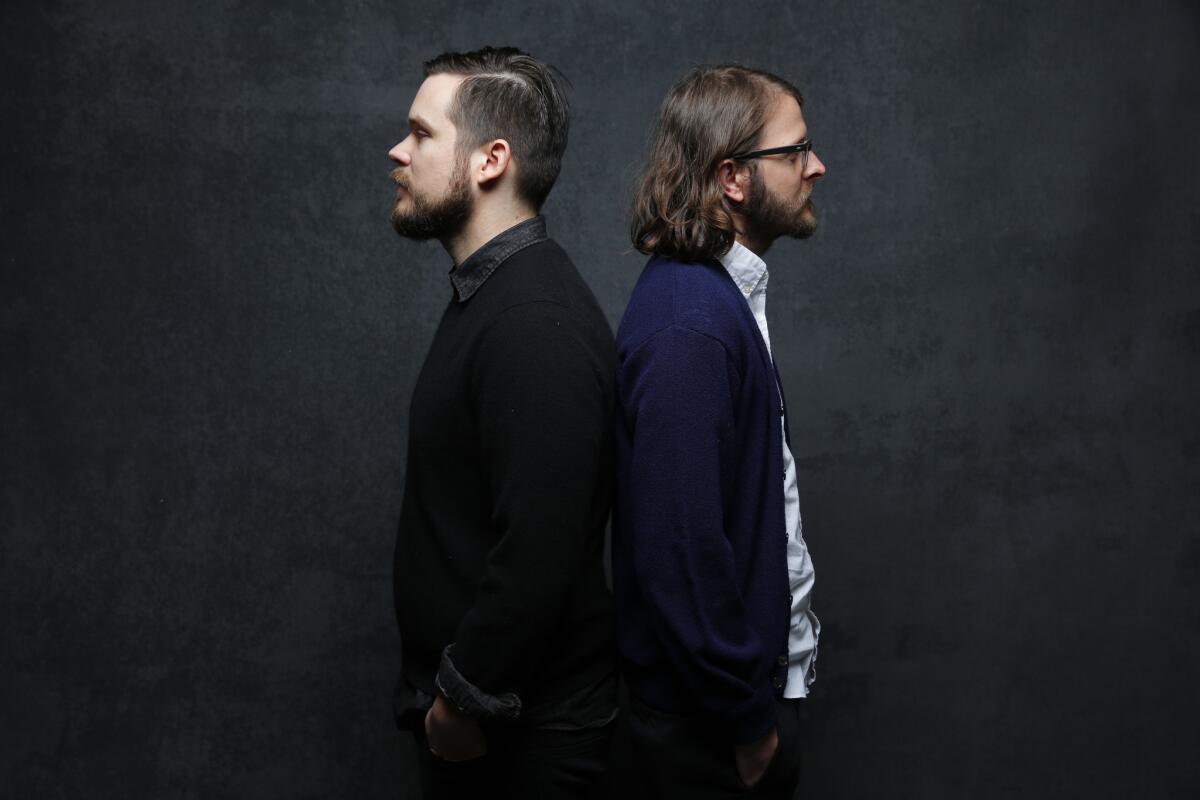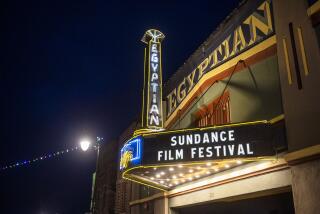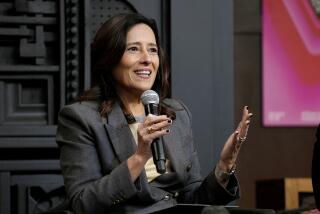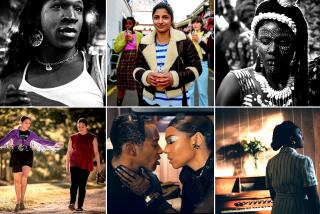Sundance 2015: White supremacist guest leads to heated ‘Welcome to Leith’ Q&A

“I liked your film, but this is disgusting.”
It was a dramatic and confrontational scene at the post-screening Q&A for the documentary “Welcome To Leith” on Thursday night, as many in the audience turned against the filmmakers and festival staff over the appearance via teleconferencing of one of the film’s subjects, white supremacist Craig Cobb.
In introducing the screening, at Sundance’s Temple Theatre venue inside a synagogue, filmmakers Michael Beach Nichols and Christopher K. Walker simply noted that “there’ll be a Q&A with one of the subjects from the film.” The film chronicles the attempt by Cobb to take over the small town of Leith, N.D., and transform it into a haven for white supremacists.
FULL COVERAGE: Sundance Film Festival 2015
The town has a population of only 24, and so as Cobb bought parcels of land that he would in turn deed over to like-minded people, his plan was to gain enough local votes and political power to legally run the town. Cobb was eventually jailed for terrorizing residents with a gun and is now out of prison and living elsewhere in North Dakota.
The film, playing as part of the festival’s U.S. documentary competition, has been well received by critics and was singled out by Times critic Kenneth Turan and New York Times critic Manohla Dargis as one of the highlights of the festival. Seeking theatrical distribution, the film will be broadcast on PBS at a future date.
At earlier Sundance screenings of the film, Leith’s Mayor Ryan Schock appeared for Q&As. After the screening Thursday, Nichols said, “one person from the film would like to participate in the Q&A tonight, so I’d like to introduce Craig Cobb.”
An air of shocked surprise went through the crowd, and as people looked around to see if Cobb was there, he suddenly loomed over the room on the theater’s screen via Skype.
“Good evening Mr. Cobb. Welcome to Sundance, virtually,” said Sundance programmer Hussain Currimbhoy, who moderated the event. “My name is Hussain Ali Currimbhoy. I’m the programmer here at Sundance and Temple Har Shalom.” This was met with laughs and a roar of approval from the crowd.
Currimbhoy asked the first question of Cobb, as to why he agreed to participate in the film.
“All during the conception and manifestation of what occurred, I would run algorithms in my head, really just binary code, if not this than that, if not that than this,” said Cobb, with a white beard and white hair in a dark jacket over a red shirt and white tie against a silver background.
“In the case of the film, by and by,” continued Cobb, who has not yet seen the finished film, “I began to realize that Mike Nichols and Chris Walker were pretty much straight shooters, so it would help the message to be promulgated over time. And they did a very good job.”
The next question was from the audience and directed to the filmmakers, as to what was the most uncomfortable moment in shooting the film.
“We didn’t want to make the film unless we could speak to every side, every perspective,” said Nichols. “It would be very easy to tell the story of the Leith residents solely but that wasn’t what we were interested in doing. We wanted to tell Mr. Cobb’s story and what he wanted to do as well. Because that was the story, this story was what was happening in Leith, N.D.
“There were a lot of tense feelings and anxiety and people were scared,” Nichols added. “So as we were filming this, we were certainly feeling that experience as filmmakers, behind the camera. You’re sort of hiding behind the camera but the emotions are definitely rubbing off on you.”
It was at this point, less than five minutes into the Q&A, that things began to turn. One person in teh audience asked Mr. Cobb if he had ever fallen in love. This led to a slightly rambling, minute-long answer from Cobb in which he said he was thankful that where he is currently living doesn’t have a Girl Scout troop, “so I don’t have to contend with that feminine aspect of human reality, which is emotional and not logical.”
“I’m offended by all of this,” shouted a woman from the audience. “This guy is a dangerous white supremacist and I think giving him a platform and trying to make a spectacle out of this is appalling.”
Currimbhoy attempted to calm the situation by saying, “We’re just trying to have a discussion, ma’am. We’re just trying to have an even debate here, that’s all.”
Someone else in the crowd angrily shouted a question asking why Cobb is afraid of Jews, which went unanswered. Nichols and Walker then answered a question as to how they first heard of what was happening in Leith.
Someone then asked Cobb about the court’s assessment of his mental health, which lead to a two-minute response in which he said “because of the troposphere the propagandistic atmosphere has been promulgated primarily through television but really through all media” and that “the medicalization of dissent was begun seriously by Jewish communists in the Soviet Union.”
Currimbhoy then cut Cobb off and after much shouting from the crowd the filmmakers answered a question as to whether the Q&A was just giving Cobb a platform to speak.
“We feel that it is important to know that these thoughts exist, in this country, that we’re living in right now and it’s uncomfortable for people to hear them,” said Nichols, “and I think that is perfectly logical and I think that that makes sense, but this exists. You can’t hide from it, you can’t watch a film and then want to pretend that these people don’t exist. That’s what I have to say about that.”
After a few more false starts on questions and answers, the Q&A ended after about 10 minutes and Cobb left the screen. As the crowd was exiting the theater, a small group gathered near the podium in front around Currimbhoy and the filmmakers, expressing anger over what had just happened for a few more minutes. Eventually the theater cleared.
A few minutes later, in an empty hallway off the theater’s lobby, Currimbhoy said: “I hoped there would be more engagement and discussion with Mr. Cobb. I really wanted it to be an open dialogue about this, but it’s hard to penetrate sometimes that much anger and hate, especially over Skype. But the audience got to see the reality of what’s happening and he got to see the reality of what his ideas do.”
He added, “I was a little surprised by people being that upset.”
In a separate interview after the Q&A, the filmmakers said that Cobb had contacted them after the film was accepted into the festival, expressing interest in participating. Uncertain as to whether the conditions of his parole would allow him to come to Utah, and also not wanting Cobb and Schock in the same room, they decided on a video link as a compromise.
“Our whole thing was we tried to be as objective as possible and Cobb has to be a part of the presentation of the film,” said Nichols. “He’s in the film and we can’t just exclude him. He opened up and he let us tell his story and we felt like it would be unfair to just totally cut him out.”
As for the heated and chaotic outcome of the Q&A, Nichols added: “He’s a frightening guy with abhorrent beliefs and we knew that this would be a very tense thing but we thought it was important because we think people should know that these kind of people exist. Our whole film is about objectivity and showing both sides.
“We were nervous about tonight, but we felt like it was an important conversation that we wanted to attempt to have.”
Follow on Twitter: @IndieFocus
More to Read
Only good movies
Get the Indie Focus newsletter, Mark Olsen's weekly guide to the world of cinema.
You may occasionally receive promotional content from the Los Angeles Times.







